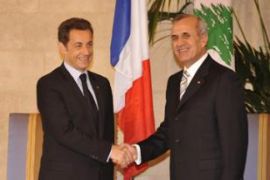Sarkozy meets Lebanese leaders
French president visits Lebanon to support power sharing deal.

The French delegation is set to meet leaders of 14 Lebanese political parties, including Hezbollah.
| The international community, Europe and France will remain committed to Lebanon’s interests on all fronts” Nicolas Sarkozy, French president |
Along with Francois Fillon, France’s prime minister, the delegation includes Bernard Kouchner, the foreign minister, and Herve Morin, the defence minister.
Sarkozy said that Lebanon had seen “too much suffering” and that it was “time to turn to the future. A future where through dialogue each Lebanese will find their place”.
“It is also time is to enable the Siniora government to act to redress the country’s economy … The international community, Europe and France will remain committed to Lebanon’s interests on all fronts.”
Sarkozy’s visit is the first by a world leader since Lebanon’s feuding leaders agreed to form a national unity cabinet giving the opposition veto powers.
Political deal
The majority bloc in the Lebanese parliament agreed a deal with the Hezbollah-led opposition on May 21 in the Gulf state of Qatar after clashes between rival supporters left at least 65 people dead.
The fierce fighting was the worst internal violence since Lebanon’s 1975-1990 civil war.
But despite the power sharing deal, the Hezbollah-led opposition and the ruling coalition continue to squabble over the formation of a government of national unity.
Siniora’s recent reappointment as Lebanon’s prime minister was met with dissatisfaction by members of the opposition.
Meanwhile, a planned visit by the French delegation to the French contingent of the United Nations Interim Force in Lebanon was cancelled to keep the visit “a purely political” one, according to the Elysee.
Instead, Morin will visit the French contingent of 1,800 soldiers, which is the second largest contingent in the south Lebanon-based peacekeeping force.